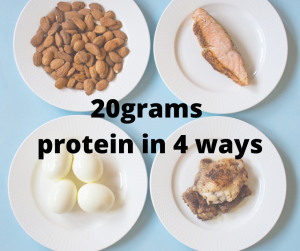Protein is one of the three macronutrients (“macros”) found in food, and it has an important role in the body. However many of our clients and followers when initially starting their lower carb journey or aiming to reverse their Type 2 Diabetes, are confused about protein intake, protein choices and overall consumption.
In this blog we focus on some starter protein basics on a low carb approach… for more starter basics you can access our free to download ebook HERE.
What is Protein?
Protein is made up of several smaller units called amino acids. Although your body is capable of making most of the 20 amino acids it needs, there are nine that it can’t make. These are known as the essential amino acids, and they must be consumed in food on a daily basis. Try our ideas if you want some exposure to the types of animal proteins we refer to, here.
Animal foods contain all 9 essential amino acids, they are considered “complete” protein. By contrast, almost all plants lack one or more essential amino acids and are referred to as “incomplete” protein. Selectively combining different varieties of plant proteins can provide all essential amino acids. Variety is key!
Why your body needs Protein?
Working out your individual Protein intake
This is where you may need help so feel encouraged to reach out to us. We generally recommend a protein intake of between 0.8-2.0 grams per kg of body weight for most people. Protein intake within this range has been shown to preserve muscle mass, improve body composition, and provide other health benefits in people who eat low-carb diets or higher-carb diets. You might think, okay well what does this mean for your own protein intake? We really cannot give your an individualised answer in this way but if you don’t want to get help right now and would rather explore for yourself try some of our meal plans, these give you the protein quantities per serve and you will be able to quickly figure out what your consuming each day.

In this image above we have chosen to show you as it demonstrates a typical day of protein choices (okay maybe not 4 eggs but certainly many people eat 2 at a time) 20g protein in each of these ideas would equal a 80g protein day… that is quite significant if someone is needing to achieve fat loss depending on their exercise level, height and gender.
How does Protein impact blood sugar levels?
Protein has been shown to lower blood glucose in studies of people with type 2 diabetes. Protein may slightly increase insulin concentrations acutely, but high protein diets are not known to cause hyperinsulinemia (chronically high insulin levels). High protein in the context of a carbohydrate reduced diet may even lower fasting insulin levels. In fact, the acute rise in insulin after a meal is probably one of the reasons why protein helps keep blood sugar low.
One of the biggest concerns with a high protein diet is that the amino acids in protein get converted to glucose via gluconeogenesis. In fact, well-conducted physiological studies show that protein is not a meaningful contributor to blood glucose either in healthy people or people with type 2 diabetes. Even a meal with 50 grams of protein didn’t cause a significant increase in blood sugar.
Should your take a Protein supplement?
Before we suggest a protein supplement to clients we need to complete a thorough dietary assessment, this happens within the first few appointments. But generally a supplement will be suggested if body repair is required whereby food intake choices will not help to play a significant role in this repair process. We commonly recommend whey protein or collagen supplements and duration/ dosage of usage will always depend person to person.
Final word on Protein!
Protein matters and to get your body to benefit from your efforts on a lower carb approach, understanding how to approach protein in your daily meal prep is key.
We are here to help…
Thank you for reading our latest blog. If you would like to keep learning more our other blogs are – here –. Should this blog have made you think further about some nutrition help you need please reach out to our clinic, – here – are our contact details.




